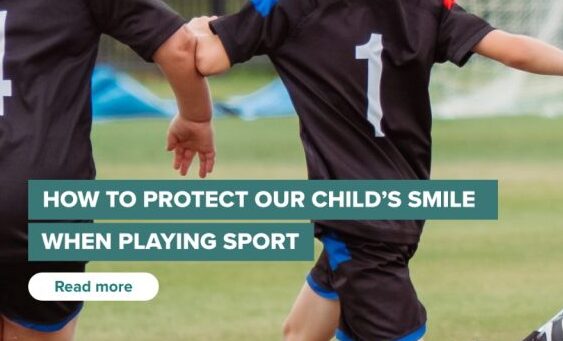PUBLISHED ON 29/03/23

What we would all give to be young and carefree again: summer nights playing at the park, weekend sports competitions and consuming sugary drinks and sweets until you’re actively buzzing. It’s all fun and games until somebody loses a tooth – or a set of teeth.
Your child’s health should always be your top priority. But that doesn’t mean children can’t have fun and be children. Kids should be allowed to play and have fun without worry. With our tips, you can rest assured that their oral health is as protected as possible.
Mouthguards
A hockey ball, basketball, soccer ball, netball, or stray arms, legs or feet can all do the same damage when it hits your teeth. So children who participate in sports, including high-contact water sports, need that added protection. Mouthguards reduce the risk of teeth-related sports injuries. In fact, sports-related dental injuries account for nearly 40 per cent of all dental injuries in Australia.
There are two types of mouthguards you can purchase for your child: custom or store-bought. Custom mouthguards are made at the dentist. Using a 3D scan of your child’s teeth, dentists can produce a mouthguard that fits precisely around their teeth and gums. On the other hand, store-bought mouthguards are the cheaper alternative and can be bought from any chemist or sporting goods store. They are generic plastic mouthguards that can be moulded within the mouth to fit around your teeth. Although they don’t offer the same level of protection as custom made mouthguards, using a store-bought mouthguard is always better than not using a mouthguard at all.
Encourage sportsmanship
It’s easy to get swept up in the moment and let our emotions get the better of us – particularly in a competitive environment. However, aggressive manoeuvres in the heat of the moment are dangerous and can increase the risk of injury. As adults, we need to teach our children how to be good sports to minimise any aggression on the field. Educating children on the rules of the game and behaviours labelled as unsportsmanlike will ensure that all children can have a good, clean, injury-free game.
But what do you do if a tooth does come out?
Accidents happen; they’re bound to. Sometimes these accidents lead to losing a tooth. When this happens, it’s important to stay calm. So what should you do? If the knocked-out tooth is an adult tooth, we recommend you rinse the tooth with milk or saline, holding it by the crown, not the root and replace the tooth in the gum socket. If you can’t replace the tooth yourself, store it in milk or saliva and seek emergency dental care as soon as possible. Do not rinse or store the tooth in water. Do not replace a baby tooth in the gum socket. This can damage the permanent tooth sitting under the gum.
A chipped or cracked tooth may not be painful. However, it’s important to get it repaired as soon as possible to improve the survival chance of the damaged tooth.
We can ban our children from sugary drinks all we want, but they’re kids! They’ll find a way to get their hands on any sugary contraband if they want to. So what can we do to protect their teeth?
Limit quantities
You may not be able to cut out sugary drinks from your child’s diet completely. However, you can limit their consumption by encouraging them to drink more water and save sugar-filled beverages for special occasions. Doing so will effectively decrease the opportunities for their teeth to be damaged.
Limit the amount of time it takes your child to drink soft drink in one sitting
Damage to your child’s oral health begins from the first sip and continues for 30 minutes after the last sip. So while you don’t want to rush your child to finish their drink, you need to ensure they don’t nurse their drink all day.
Use straws
Drinking through a straw helps stop the sugary liquid from hitting your teeth – minimising any damage the acid and sugars in drinks can have on teeth.
Rinse
A good habit to get into is to wash down sugary drinks with something less sugary, like water or milk. This will help flush away sugar or acid lingering in the mouth and decrease the possibility of damage.
See the dentist regularly
Most importantly, scheduling regular check-ups and cleanings will ensure your child’s oral health is in tip-top shape. Even if they don’t consume much sugar, a check-up every six months allows dentists to examine their oral health, assess their oral hygiene habits and find any potential dental problems that may arise.
Our children will always want to play and will probably always sneak sweets and sugary drinks behind our backs – especially with the rise in popularity of milk tea. We shouldn’t stop our kids from being kids, but we should protect them as best we can. So book an appointment with Maidstone Dental today to ensure your child’s teeth are as healthy as possible.
When was your child’s last dentist appointment? Are they due for another check-up? Make an appointment today., click here.